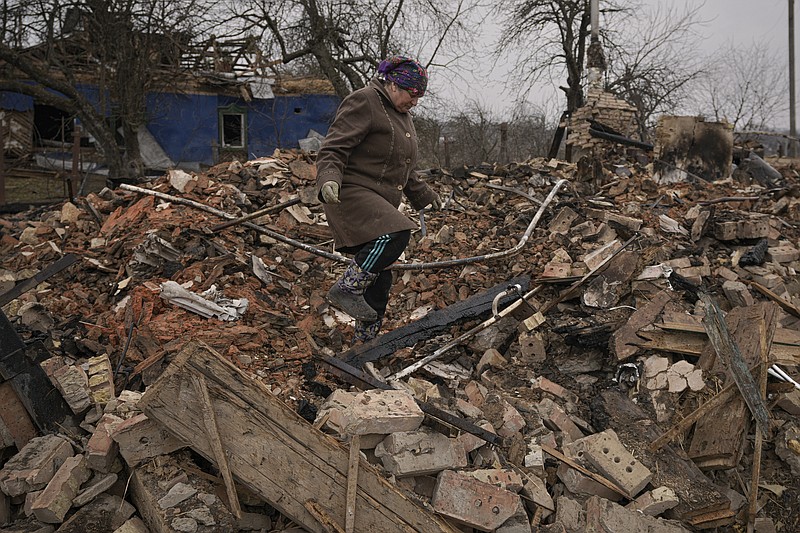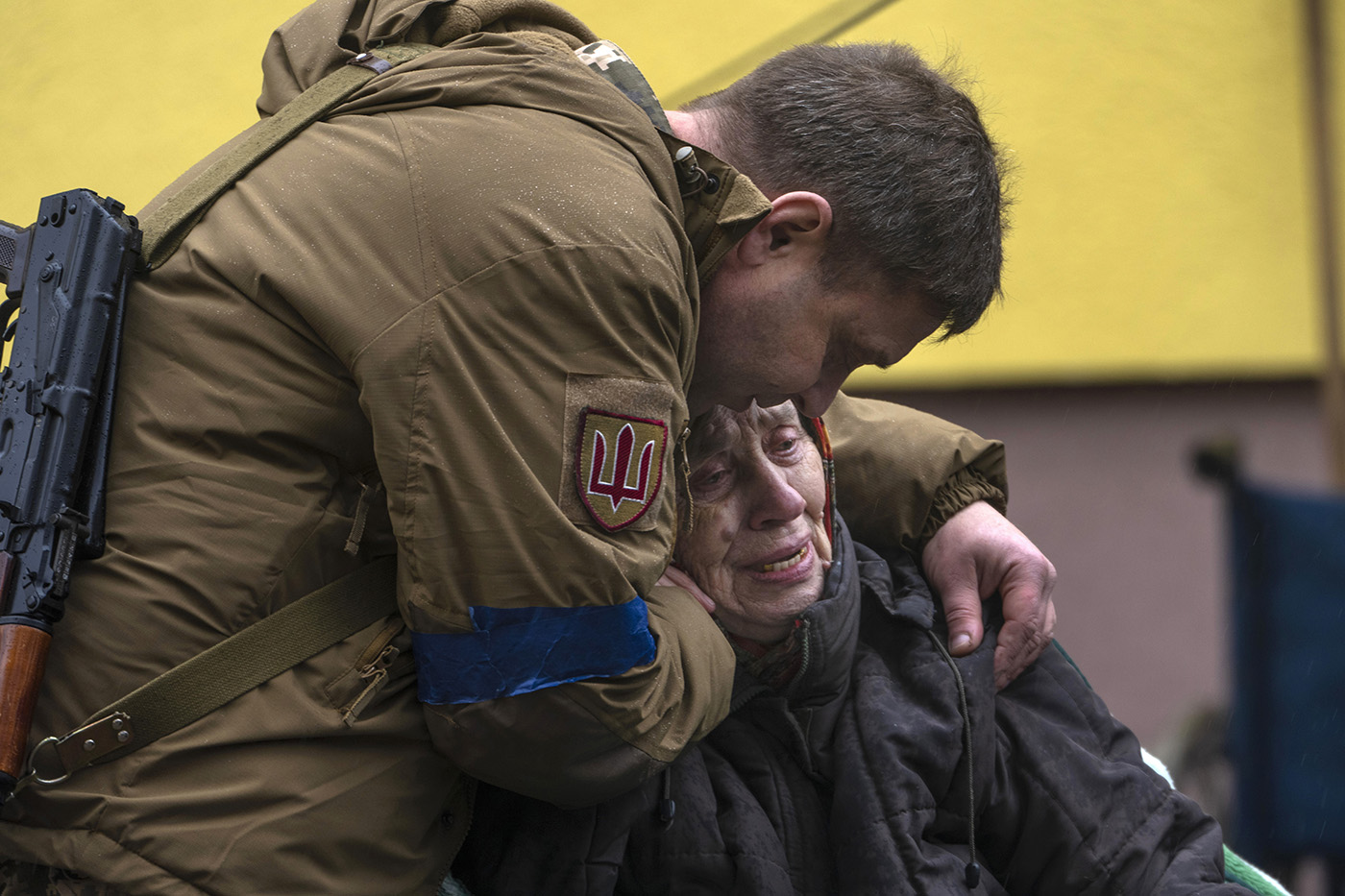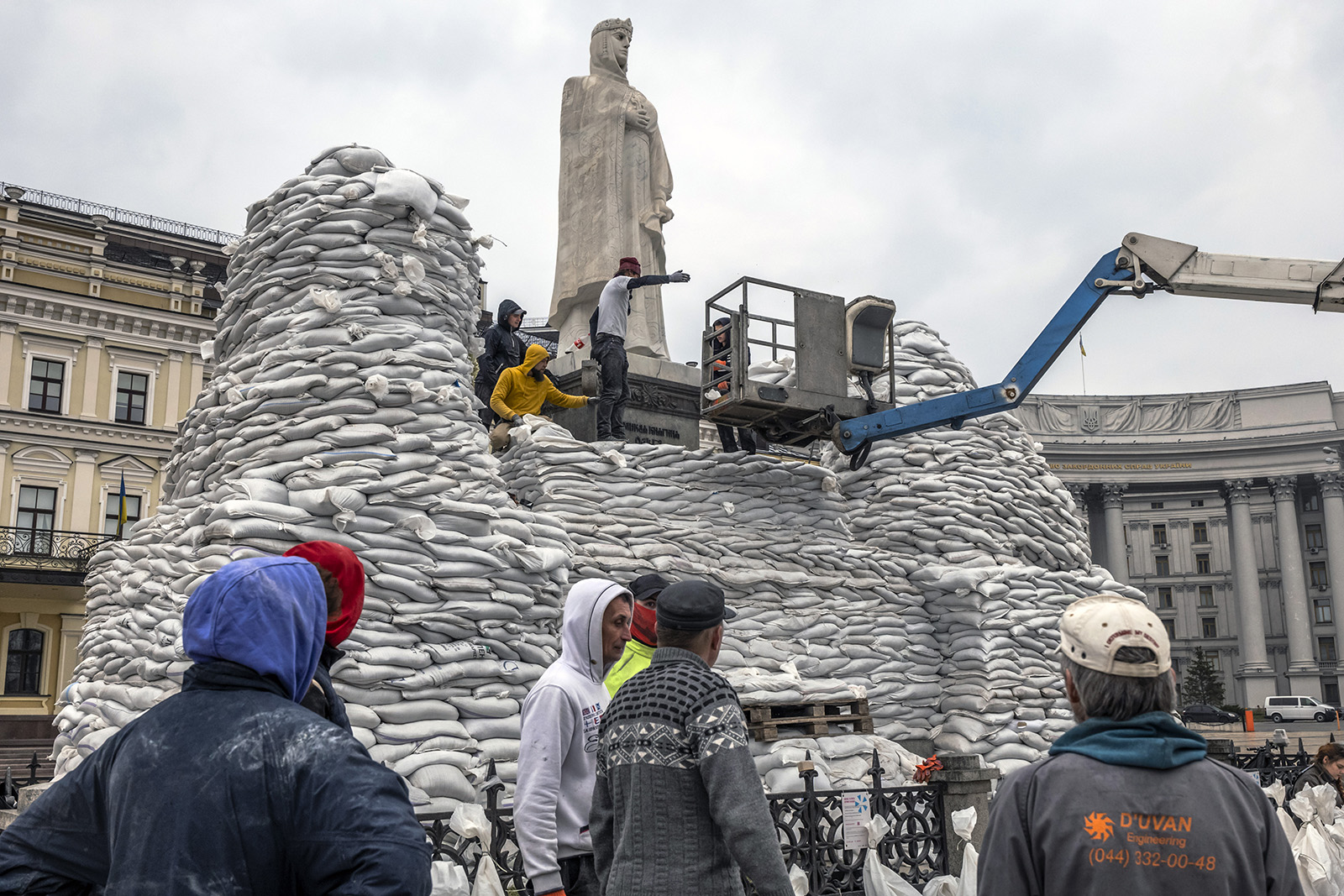KYIV, Ukraine -- Russian forces bombarded areas around Kyiv and another Ukrainian city just hours after pledging to scale back operations in those zones to promote trust between the two sides, Ukrainian authorities said Wednesday.
The shelling -- and intensified Russian attacks on other parts of the country -- tempered optimism about any progress in the talks aimed at ending the punishing war.
Ukrainian President Volodymyr Zelenskyy said he stressed in a conversation with U.S. President Joe Biden that the war is at a "turning point" and renewed his longstanding request for more help to resist the Russian invasion.
"If we really are fighting for freedom and in defense of democracy together, then we have a right to demand help in this difficult turning point. Tanks, aircraft, artillery systems. Freedom should be armed no worse than tyranny," Zelenskyy said. He thanked the U.S. for an additional $500 million in aid that was announced Wednesday.
Meanwhile, talks between Ukraine and Russia were set to resume Friday by video, according to the head of the Ukrainian delegation, David Arakhamia. The Russian military reneged on its pledge Tuesday to deescalate near the capital and the northern city of Chernihiv in order to "increase mutual trust and create conditions for further negotiations."
Soon after, Ukrainian officials reported that Russian shelling hit homes, stores, libraries and other civilian sites in and around Chernihiv and on the outskirts of Kyiv. Russian troops also stepped up their attacks on the Donbas region in the east and around the city of Izyum, which lies on a key route to the Donbas, after redeploying units from other areas, the Ukrainian side said.
Olexander Lomako, secretary of the Chernihiv city council, said the Russian announcement turned out to be "a complete lie."
Zelenskyy said the continuing negotiations with Russia were only "words without specifics."
"We know that this is not a withdrawal but the consequences of being driven out," Zelenskyy said of Russia's pledge. "But we also are seeing that Russia is now concentrating its forces for new strikes on Donbas, and we are preparing for this."
Oleksandr Pavliuk, head of the Kyiv region military administration, said Russian shells targeted residential areas and civilian infrastructure in the Bucha, Brovary and Vyshhorod regions around the capital.
Russian Defense Ministry spokesman Maj. Gen. Igor Konashenkov said the military also targeted fuel depots in two towns in central Ukraine with air-launched long-range cruise missiles. And Russian forces hit a Ukrainian special forces headquarters in the southern Mykolaiv region, he said, and two ammunition depots in the Donetsk region, which is part of the Donbas.
In southern Ukraine, a Russian missile destroyed a fuel depot in Dnipro, the country's fourth-largest city, regional officials said.
A missile also destroyed part of an apartment block in the rebel-controlled city of Donetsk early Wednesday, and two people were reported killed. Separatists blamed Ukrainian forces for the attack.
Meanwhile, the U.S. said that over the past 24 hours, Russia had begun to reposition less than 20% of its troops that had been arrayed around Kyiv.
Pentagon press secretary John Kirby said that troops from there and some other zones have begun moving largely to the north, and some have gone into Belarus. Kirby said it appears Russia intends to resupply them and send them back into Ukraine, but it is not clear where.
The Ukrainian military said some Russian airborne units were recorded in neighboring Belarus and were believed to have withdrawn from Ukraine.
In northern Ukraine, Russian forces took no offensive actions Wednesday, focusing on reconnaissance and logistics, the general staff said in a statement.
But Russia is expected to increase attacks soon on Ukrainian forces to protect its own troops as they are repositioned, it said.
The Russians also are expected to try to blockade Chernihiv.
Top Russian military officials have said in recent days that their main goal now is the "liberation" of Donbas, the predominantly Russian-speaking industrial heartland where Moscow-backed separatists have been battling Ukrainian forces since 2014. Western officials say Moscow is reinforcing its troops in the Donbas.
RUSSIAN PERSPECTIVE
At a round of talks held Tuesday in Istanbul, the faint outlines of a possible peace agreement seemed to emerge when the Ukrainian delegation offered a framework under which the country would declare itself neutral -- dropping its bid to join NATO, as Moscow has long demanded -- in return for security guarantees from a group of other nations.
The Kremlin's chief negotiator, Vladimir Medinsky, read a statement that described Ukraine's proposal Tuesday to declare neutrality as a core concession to Russia, just hours after Kremlin spokesperson Dmitry Peskov said that the talks in Istanbul had produced nothing "very promising."
Medinsky said, "Yesterday, the Ukrainian side for the first time outlined its readiness, in writing, to fulfill a number of important conditions for building normal and, I hope, good neighborly relations with Russia."
He listed a series of concessions, such as refusing to host foreign troops, that he said Ukraine was prepared to make. "If these conditions are fulfilled, then the threat of a NATO bridgehead being created on Ukrainian territory will be liquidated," Medinsky said.
He said Russia was determined to keep negotiating, and Mykhailo Podolyak, a member of Ukraine's delegation in Istanbul, said the talks had yielded "proof of the viability of Ukrainian statehood."
Foreign Minister Sergey Lavrov said Wednesday that Ukraine's willingness to accept neutrality and look outside NATO for security represents "significant progress," according to Russian news agencies.
The positive language from the negotiators clashed markedly with the rhetoric coming out of Moscow, where supporters of the war decried Medinsky's diplomacy as bordering on traitorous.
"Any talks with Nazis before your boot is on their throat are perceived as weakness," Vladimir Solovyov, a popular state television host, said on his YouTube show, reprising the Kremlin's false characterization of the Ukrainian government as "Nazis." "You cannot meet with them or talk to them."
And Peskov, the Kremlin's spokesperson, said that Ukraine's willingness to put some proposals in writing was a "positive factor" but that there was little progress to report otherwise.
"We do not see anything very promising or any breakthroughs," Peskov told reporters. "Very, very long work is ahead."
INTEL ON PUTIN
U.S. intelligence officials have determined that Russian President Vladimir Putin is being misinformed by advisers about his military's poor performance in Ukraine, according to the White House. The advisers are scared to tell him the truth, the intel says.
The findings, recently declassified, indicate that Putin is aware of the situation on information coming to him and there now is persistent tension between him and senior Russian military officials.
The U.S. believes Putin is being misled not only about his military's performance but also "how the Russian economy is being crippled by sanctions because, again, his senior advisers are too afraid to tell him the truth," White House communications director Kate Bedingfield said Wednesday.
The administration is hopeful that divulging the finding could help prod Putin to reconsider his options in Ukraine, according to a U.S. official.
The publicity could also risk further isolating Putin, who U.S. officials have said seems at least in part driven by a desire to win back Russian prestige lost by the fall of the Soviet Union.
"What it does is underscore that this has been a strategic blunder for Russia," Bedingfield said of the intelligence finding. "But I'm not going to characterize how ... Vladimir Putin might be thinking about this."
Asked about the latest intelligence, Secretary of State Antony Blinken suggested that a dynamic within the Kremlin exists where advisers are unwilling to speak to Putin with candor.
"One of the Achilles' heels of autocracies is that you don't have people in those systems that speak truth to power or have the ability to speak truth to power, and I think that's what we're seeing in Russia," Blinken said on Wednesday.
The official did not detail underlying evidence for how U.S. intelligence made its determination.
The findings demonstrate a "clear breakdown in the flow of accurate information" to Putin, the official said.
U.S. officials have said publicly they believe that limited flow of information may have given the Russian president unrealistic views of how quickly he could overrun Ukraine.
The Biden administration before the war launched an unprecedented effort to publicize what it believed were Putin's invasion plans, drawing on intelligence findings. While Russia still invaded, the White House was widely credited with drawing attention to Ukraine and pushing initially reluctant allies to back tough sanctions that have hammered the Russian economy.
But underscoring the limits of intelligence, the U.S. also underestimated Ukraine's will to fight before the invasion, said Lt. Gen. Scott Berrier, head of the Defense Intelligence Agency.
4 MILLION REFUGEES
The U.N. refugee agency, UNHCR, said Wednesday that more than 4 million people have left Ukraine since Russia launched its invasion on Feb. 24 and sparked Europe's largest refugee crisis since World War II. That number exceeds the worst-case predictions made at the start of the war.
Half of the refugees from Ukraine are children, according to UNHCR and the U.N. children's agency UNICEF.
"I think it's a tragic milestone," Alex Mundt, the UNHCR senior emergency coordinator in Poland, said. "It means that in less than a month or in just about a month, 4 million people have been uprooted from their homes, from their families, their communities, in what is the fastest exodus of refugees moving in recent history."
More than 2.3 million refugees from Ukraine entered Poland, but some have since traveled on to other countries. A small number have returned to Ukraine, either to help in the defense against the Russians or to care for relatives.
More than 608,000 refugees have entered Romania, over 387,000 have gone to Moldova, and about 364,000 have entered Hungary in the last five weeks, UNHCR said, based on counts provided by the governments of those countries.
"The situation inside Ukraine is spiraling," UNICEF Executive Director Catherine Russell said in a statement Wednesday. "As the number of children fleeing their homes continues to climb, we must remember that every single one of them needs protection, education, safety and support."
U.N. High Commissioner for Refugees Filippo Grandi entered Ukraine on Wednesday and said he would be in the western city of Lviv and discuss ways to increase support "to people affected and displaced by this senseless war."
UNHCR projected from the onset that about 4 million people might flee Ukraine and said it was regularly reassessing its forecasts.
Aid workers say the number of people fleeing eased in recent days as many residents awaited indications of the direction the invasion might take. The U.N. estimates the war also has displaced 6.5 million people within the country.
The International Organization for Migration, which tracks not just refugees but all people on the move from their homes, reported earlier this month that more than 12 million people are estimated to be stranded in areas of Ukraine under attack or cannot leave because of security risks, the destruction of bridges and roads and a lack of information about safe destinations and lodging.
All told, more than 22 million people are either blocked from moving or have been forced to flee, the organization figures show.
Information for this article was contributed by Nebi Qena, Bassam Hatoum, Jamey Keaten, Vaneesa Gera, Stephen McGrath, Srdjan Nedeljkovic, Yuras Karmanau, Matthew Lee, Lolita C. Baldor, Aamer Madhani, Nomaan Merchant and staff members of The Associated Press and Anton Troianovski of The New York Times.
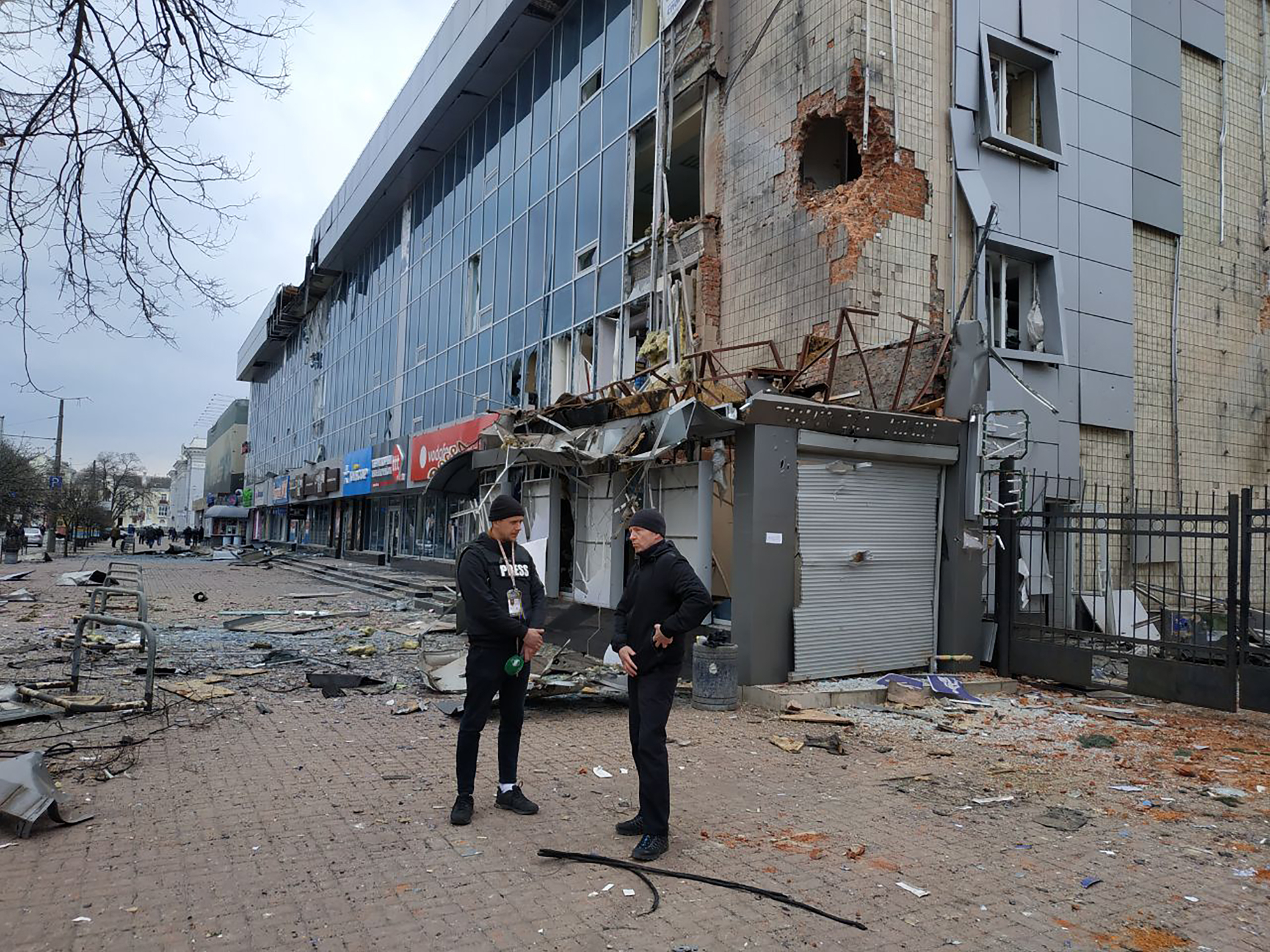 Mayor of Chernihiv Vadyslav Atroshenko, right, speaks to a journalist near the shopping mall damaged by night shelling in Chernihiv, Ukraine, Wednesday, March 30, 2022. Ukrainian officials say Russian forces pounded areas around Kyiv and another Ukrainian city overnight. The attacks come hours after Moscow pledged to scale back military operations in those places.(AP Photo/Vladislav Savenok)
Mayor of Chernihiv Vadyslav Atroshenko, right, speaks to a journalist near the shopping mall damaged by night shelling in Chernihiv, Ukraine, Wednesday, March 30, 2022. Ukrainian officials say Russian forces pounded areas around Kyiv and another Ukrainian city overnight. The attacks come hours after Moscow pledged to scale back military operations in those places.(AP Photo/Vladislav Savenok)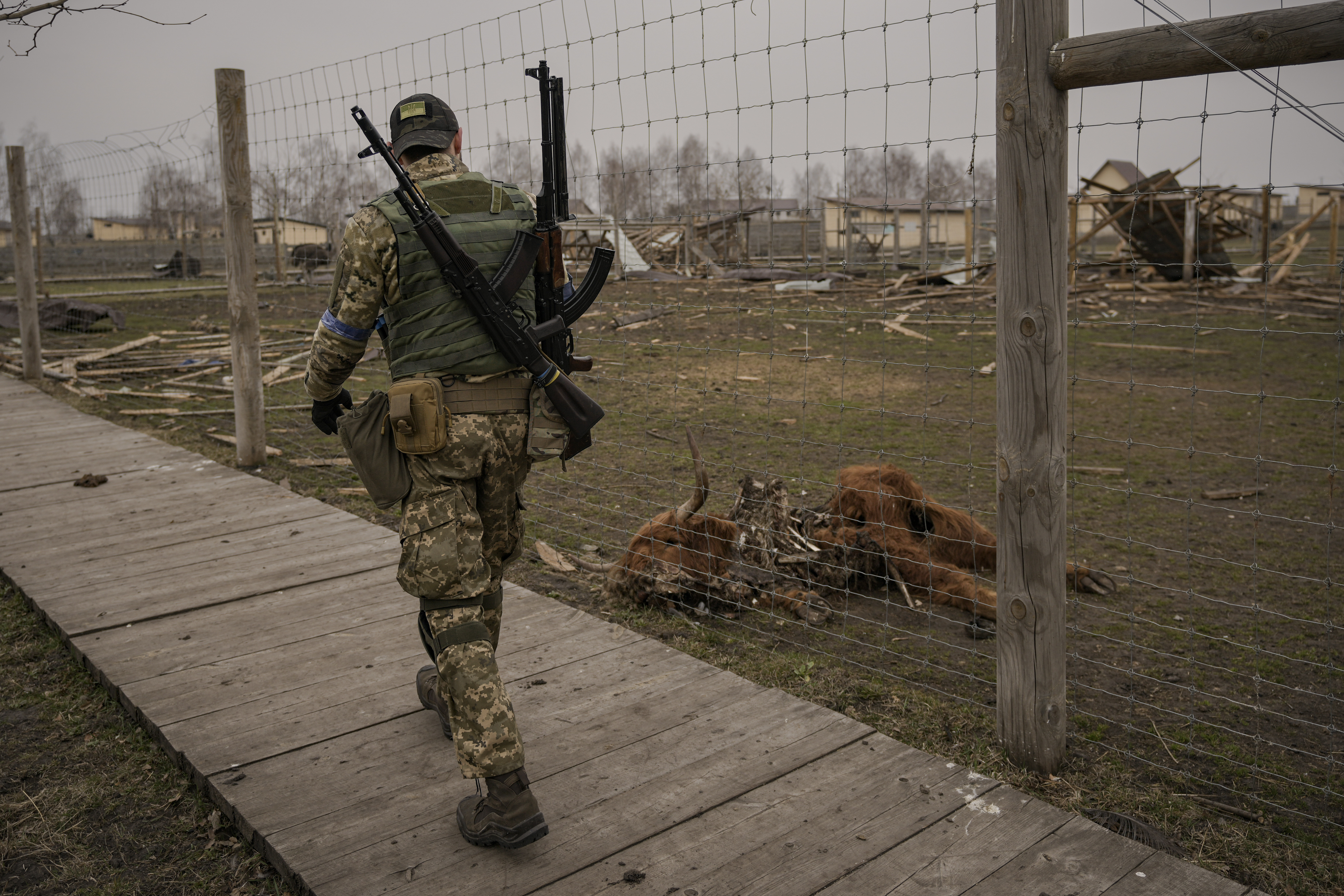 A Ukrainian serviceman walks by an animal which was killed during fighting at a heavily damaged private zoo while soldiers and volunteers attempted to evacuate the surviving animals to safety in the village of Yasnohorodka, on the outskirts of Kyiv, Ukraine, Wednesday, March 30, 2022. The evacuation was halted before completion as shelling resumed between Russian and Ukrainian forces in the area.(AP Photo/Vadim Ghirda)
A Ukrainian serviceman walks by an animal which was killed during fighting at a heavily damaged private zoo while soldiers and volunteers attempted to evacuate the surviving animals to safety in the village of Yasnohorodka, on the outskirts of Kyiv, Ukraine, Wednesday, March 30, 2022. The evacuation was halted before completion as shelling resumed between Russian and Ukrainian forces in the area.(AP Photo/Vadim Ghirda)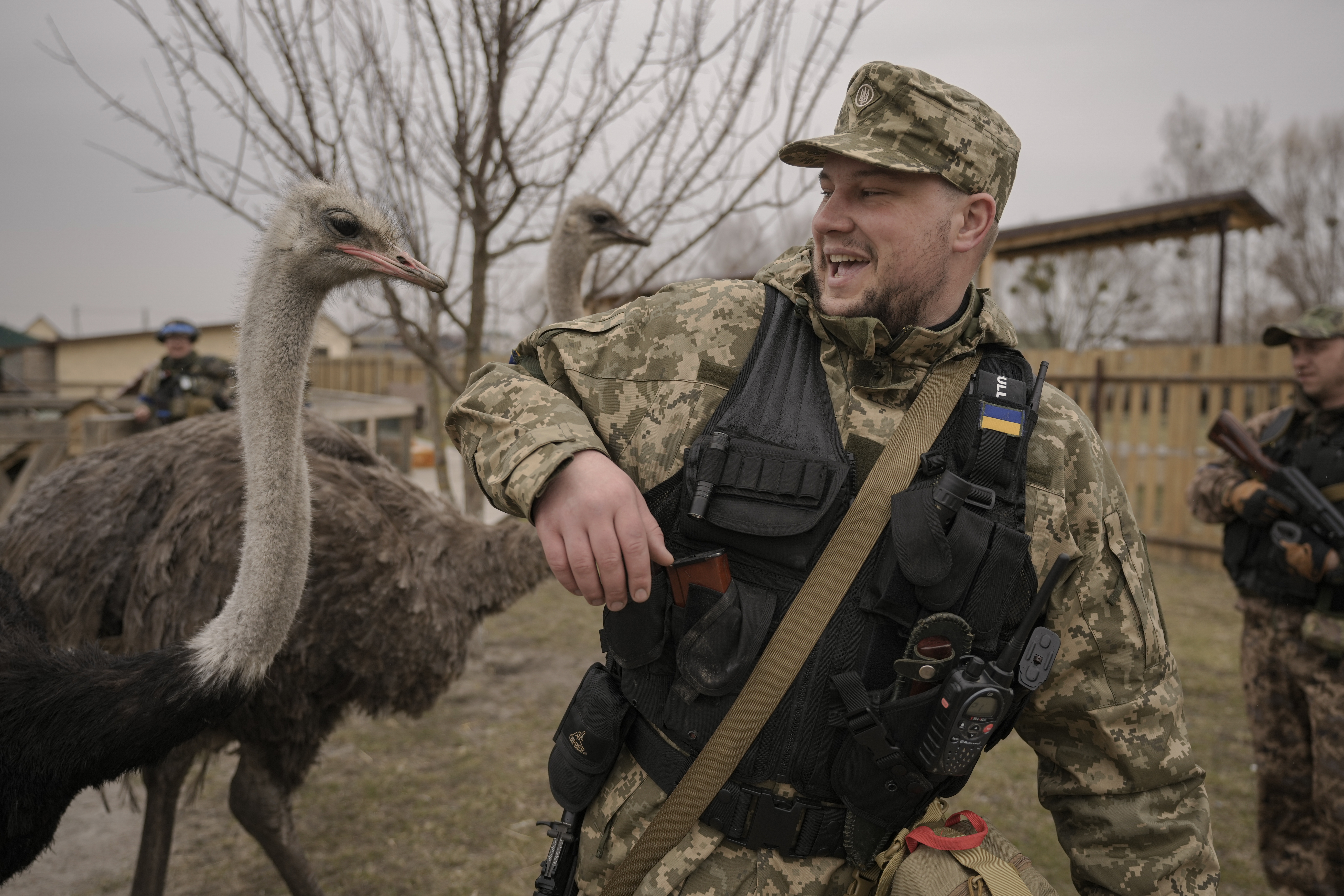 A Ukrainian serviceman tries to avoid being bitten by an ostrich at a heavily damaged private zoo as soldiers and volunteers attempted to evacuate the surviving animals to safety in the village of Yasnohorodka, on the outskirts of Kyiv, Ukraine, Wednesday, March 30, 2022. The evacuation was halted before completion as shelling resumed between Russian and Ukrainian forces in the area.(AP Photo/Vadim Ghirda)
A Ukrainian serviceman tries to avoid being bitten by an ostrich at a heavily damaged private zoo as soldiers and volunteers attempted to evacuate the surviving animals to safety in the village of Yasnohorodka, on the outskirts of Kyiv, Ukraine, Wednesday, March 30, 2022. The evacuation was halted before completion as shelling resumed between Russian and Ukrainian forces in the area.(AP Photo/Vadim Ghirda)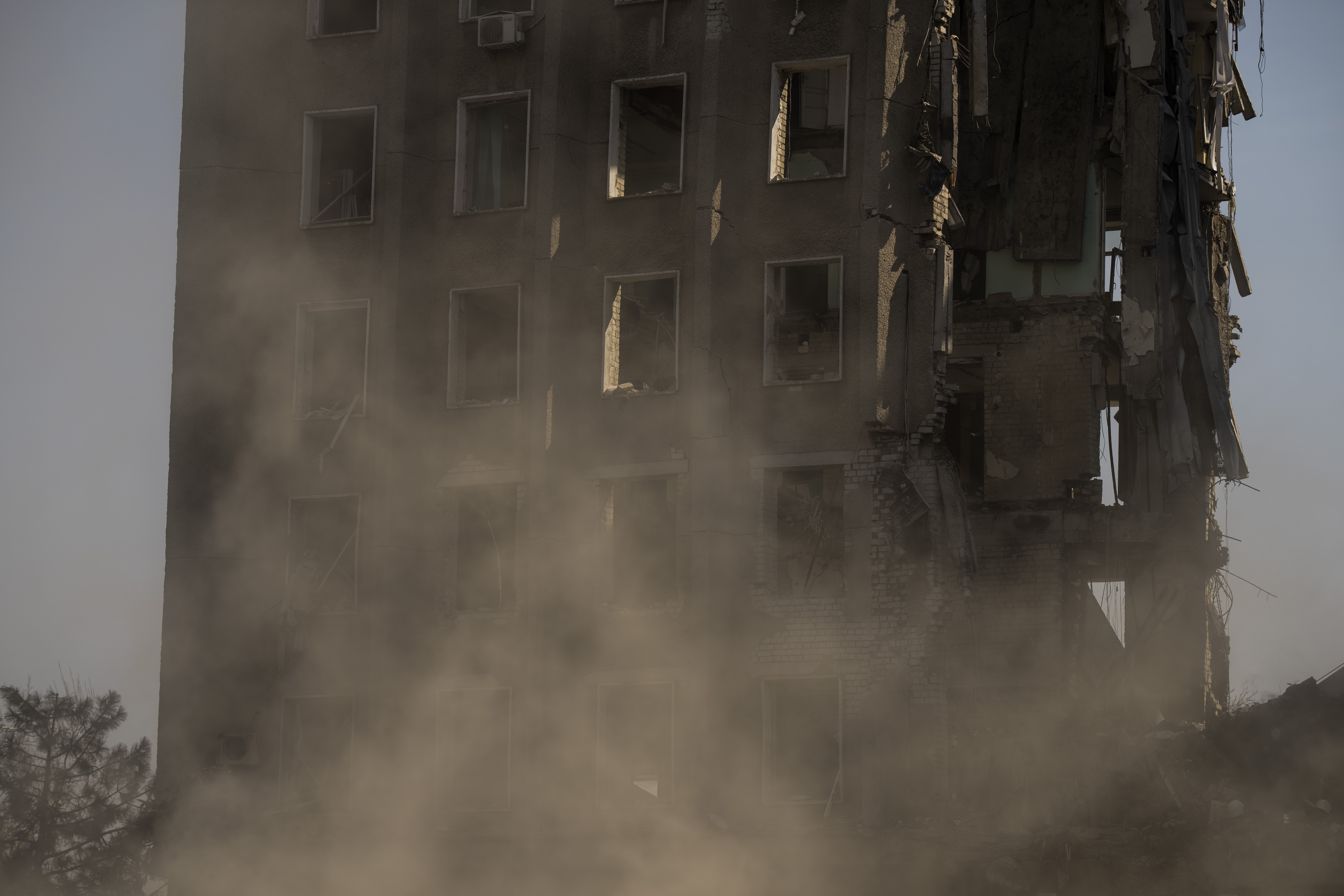 Smoke rises in front of damaged regional government headquarters of Mykolaiv, Ukraine, as workers remove the debris from the site, following a Russian attack, on Wednesday, March 30, 2022. At least 15 people were killed in a missile strike on the regional government headquarters on Tuesday, March 29,in the southern city of Mykolayiv. (AP Photo/Petros Giannakouris)
Smoke rises in front of damaged regional government headquarters of Mykolaiv, Ukraine, as workers remove the debris from the site, following a Russian attack, on Wednesday, March 30, 2022. At least 15 people were killed in a missile strike on the regional government headquarters on Tuesday, March 29,in the southern city of Mykolayiv. (AP Photo/Petros Giannakouris)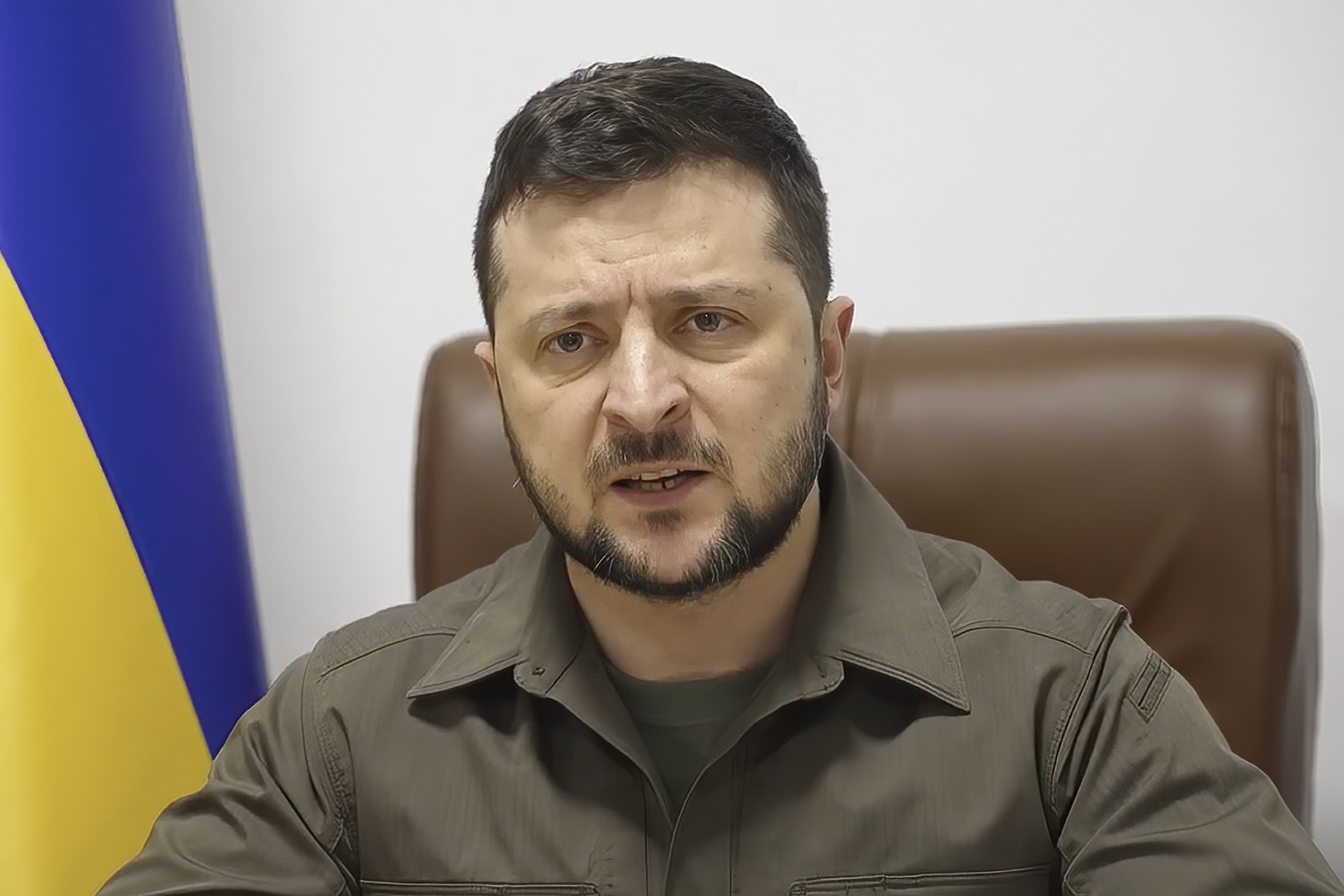 In this image from video provided by the Ukrainian Presidential Press Office, Ukrainian President Volodymyr Zelenskyy speaks to the Norwegian Parliament from Kyiv, Ukraine, Wednesday, March 30, 2022. Zelenskyy, speaking through an interpreter during a live video appearance before the 169-member Stortinget, said that "the future of Europe is being decided now." (Ukrainian Presidential Press Office via AP)
In this image from video provided by the Ukrainian Presidential Press Office, Ukrainian President Volodymyr Zelenskyy speaks to the Norwegian Parliament from Kyiv, Ukraine, Wednesday, March 30, 2022. Zelenskyy, speaking through an interpreter during a live video appearance before the 169-member Stortinget, said that "the future of Europe is being decided now." (Ukrainian Presidential Press Office via AP)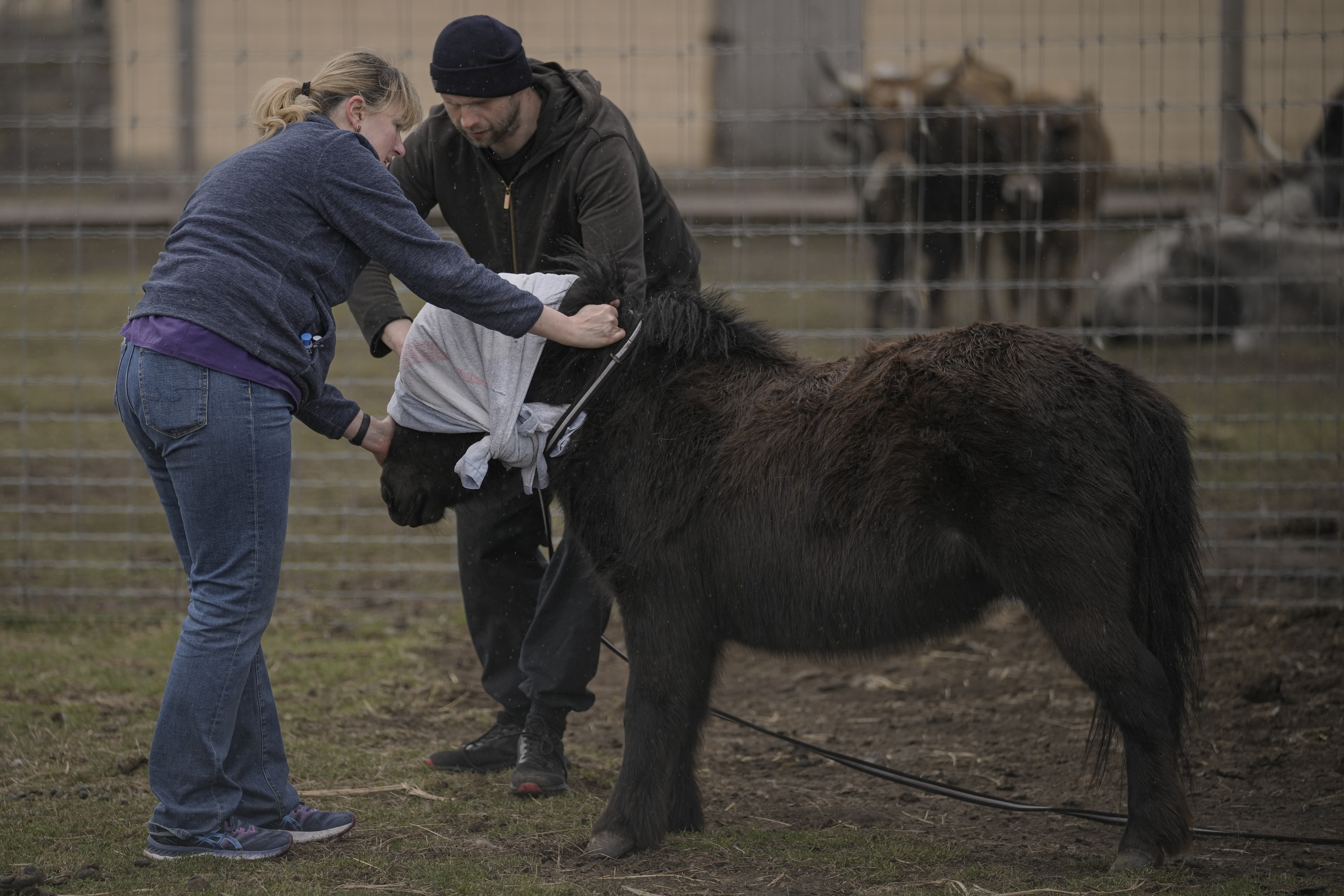 Volunteers blindfold a pony to reduce its stress levels before taking it to a truck at a heavily damaged private zoo while attempting to evacuate the surviving animals to safety in the village of Yasnohorodka, on the outskirts of Kyiv, Ukraine, Wednesday, March 30, 2022. The evacuation was halted before completion as shelling resumed between Russian and Ukrainian forces in the area. (AP Photo/Vadim Ghirda)
Volunteers blindfold a pony to reduce its stress levels before taking it to a truck at a heavily damaged private zoo while attempting to evacuate the surviving animals to safety in the village of Yasnohorodka, on the outskirts of Kyiv, Ukraine, Wednesday, March 30, 2022. The evacuation was halted before completion as shelling resumed between Russian and Ukrainian forces in the area. (AP Photo/Vadim Ghirda)